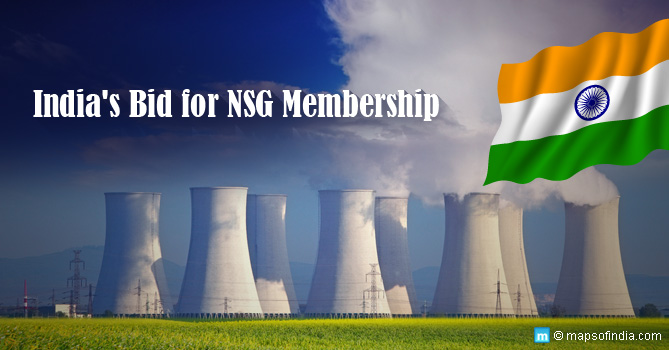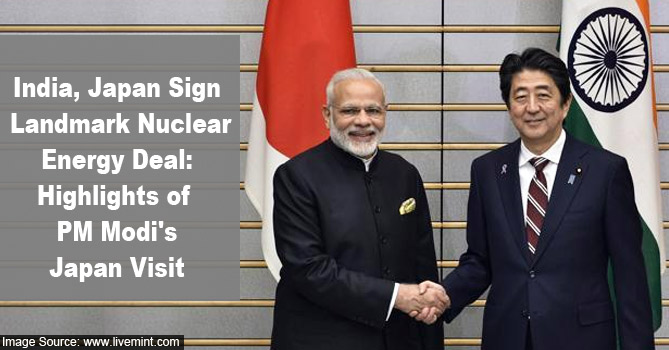The Nuclear Suppliers’ Group (NSG) is a grouping of 48 nuclear supplier countries to check proliferation of nuclear weapons based on the guidelines laid down for export of nuclear technology and nuclear related products. The 48 nation group includes the big five nuclear weapon states – US, UK, Russia, France and China. NSG was formed in 1974 after India exploded its nuclear device in Pokhran. Since India was not part of NSG, global concern for nuclear technology development and export by a non-member nation, led to the formation of NSG.
Non Proliferation Principle
Non-proliferation of Nuclear Weapons was adopted as a treaty (NPT) in 1994 which lays guidelines for signatory nations with regard to transfer of nuclear technology and ensuring legally binding checks to prevent misuse of the same.
The NSG Guidelines comprise several crucial treaties signed over the years, all with the objective to build checks and safeguards against proliferation of nuclear technology.
Current members of NSG
Austria, Argentina, Australia, Brazil, Bulgaria, Belgium, Belarus, China, Cyprus, Czech Republic, Canada, Croatia, Denmark, Estonia, France, Finland, Greece, Germany, Hungary, Italy, Iceland, Ireland, Japan, Kazakhstan, Republic of Korea, Luxembourg, Latvia, Lithuania, Mexico, Malta, Norway, Netherlands, New Zealand, Portugal, Poland, Russian Federation, Romania, Spain, Switzerland, Slovakia, South Africa, Serbia, Sweden, Slovenia, Turkey, United States, Ukraine, United Kingdom.
India seeks NSG Membership
Though not a signatory to NPT, as it considers the treaty discriminatory, India has been actively seeking to become a member of the Nuclear Suppliers Group. India’s attempt at membership got a boost during the UPA I regime, when the US administration under President George W. Bush decided to open up nuclear trade with India.
It took some serious lobbying within the US administration and Congress to get laws amended to pave way for civilian nuclear trade with India.
India’s first formal request for NSG membership came up for discussion during the NSG meeting held between 21-22 August 2008, that was aimed at providing an exception to the Guidelines and allow for a one time waiver to India for purchasing civil nuclear plant for power generation. The move was strongly opposed by New Zealand, Austria, Switzerland, Norway and Ireland. China remained opposed to India’s entry but remained low-key in its opposition letting this group take the lead to block India’s entry.
After hectic lobbying led by India and actively supported by the United States, in another meeting on 6 September the same year, member nations finally agreed to provide India a one-time ‘clean waiver’. The waiver was subject to India pledging not to share or export any sensitive nuclear technology or material and not conducting any further nuclear tests. India clearly defined its non-proliferation and disarmament policies during the NSG meeting.
Besides, India’s case has been strengthened since it has committed itself to International Atomic Energy Agency (IAEA) safeguards, wherein India has opened its civilian nuclear infrastructure to IAEA inspections.
In 2010, during a state visit to India, President Barrack Obama announced his country’s support for India joining the NSG and other critical groups like the Wassenaar Arrangement, the Missile Technology Control Regime (MTCR) and the Australia Group, in a phased manner. It may be noted here that India has finally joined the MTCR this year.
China, which remained a low-key but opposing member in 2008 has now announced that it is willing to offer ‘conditional support’ to India, saying India’s application must be treated with prudence and caution.
In order to delay India’s entry, Pakistan has now submitted an application for membership of NSG. Given its dubious past record in nuclear proliferation, it stands little chance of being taken seriously but the move is aimed at containing India’s chances of gaining entry to the exclusive club.
All eyes are now on the outcome of the NSG meeting that will decide India’s case. While expectations are high in India, it’s still not a done deal. Bloomberg has reported the case of three diplomats who have expressed reservations regarding India’s safeguards, saying it still hasn’t met member admission criteria.
They also expressed fears that any dilution in admission criteria favouring India, may lead to lower criteria being applied to subsequent applications, in a veiled reference to Pakistan’s bid for membership.
Why is NSG membership significant for India?
India has committed itself to increasing its share of clean energy, which includes renewable and non-fossil based energy, to 40% of its total energy generation.
In order to achieve this, nuclear power generation is back in focus. While India has developed its own civil nuclear technology, it still requires advanced technologies that are more efficient and lower in cost. For that, it has to access technologies available with countries like, US, Canada, Japan, Russia and France.
Without an NSG membership, accessing the same is a problem. The NSG waiver in 2008 enabled it to buy nuclear plants but there are several advanced technologies that find application in the field of medicine and medical care, transportation and space that are presently out of reach. Since India is not a signatory to NPT, NSG membership is a must.
This is why the US has been lobbying actively for India’s membership as it presents a big opportunity for nuclear related business.
‘Make in India’ is a stated objective of this government and developing an efficient and secure nuclear-based manufacturing and research ecosystem will go a long way in establishing innovation in advanced technologies. NSG membership will allow for sharing and joint research in advanced technologies that can then be exported to other member states.
India’s membership to NSG could also put the brakes of Pakistan’s ambition of becoming a member of this elite group, since membership is based on consensus among member nations. China understands this and that is yet another reason to try and get the NSG to apply parallel standards on both India and Pakistan’s membership application.
Read More:
What does PM Modi’s Japan visit mean for India?
PM Modi’s Historic Africa Visit
India Becomes Full Member of MTCR: Things to Know
The Modi-Obama Meet
PM Narendra Modi’s Switzerland Visit
Countries Visited by Narendra Modi
Key Takeaways from Modi’s Foreign Tours
Modi’s UK visit reinforces India’s status as a rising power
PM Narendra Modi’s Ireland, US Visit
PM Modi’s tour of UK and Turkey
PM Modi’s Tour of Russia and Central Asia
The Reason Behind Modi’s Russia Visit
PM Modi bridges the Gulf
Importance of Modi’s Iran Visit





